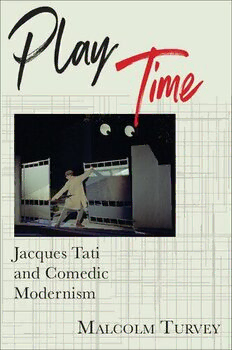
Play Time: Jacques Tati and Comedic Modernism (Film and Culture Series) PDF
Preview Play Time: Jacques Tati and Comedic Modernism (Film and Culture Series)
Play Time Jacques Tati and Comedic Modernism M T ALCOLM URVEY Play Time FILM AND CULTURE SERIES FILM AND CULTURE A series of Columbia University Press Edited by John Belton For a complete list of titles, see page 283 Play Time Jacques Tati and Comedic Modernism MALCOLM TURVEY Columbia University Press New York Columbia University Press Publishers Since 1893 New York Chichester, West Sussex cup.columbia.edu Copyright © 2020 Columbia University Press All rights reserved Library of Congress Cataloging-in-Publication Data Names: Turvey, Malcolm, 1969– author. Title: Play time : Jacques Tati and comedic modernism / Malcolm Turvey. Description: New York : Columbia University Press, [2019] | Series: Film and culture | Includes bibliographical references and index. Identifiers: LCCN 2019013487 | ISBN 9780231193023 (cloth : alk. paper) | ISBN 9780231193030 (paperback : alk. paper) | ISBN 9780231550116 (ebook) Subjects: LCSH: Tati, Jacques—Criticism and interpretation. | Comedy films—France—20th century—History and criticism. Classification: LCC PN1998.3.T374 T87 2019 | DDC 791.4302/8092—dc23 LC record available at https://lccn.loc.gov/2019013487 Columbia University Press books are printed on permanent and durable acid-free paper. Printed in the United States of America Cover design: Julia Kushnirsky Cover image: Mon Oncle (Jacques Tati, 1958) © Les Films de Mon Oncle —Specta Films C.E.P.E.C. For Will (cid:51) CONTENTS Preface and Acknowledgments ix Introduction 1 Tati’s Style 1 This Book 9 Comedic Modernism 10 Tati and Vernacular Modernism 14 Tati and Parametric Narration 16 Single Authorship 20 Intention 23 1. Comedic Modernism 27 Comedian as Object 31 Comedian as Outcast 40 René Clair and Comedic Modernism 45 2. Comedy of Everyday Life 53 Monsieur Hulot and Realism 57 Observation of Reality and Aleatory Object Analogs 64 VIII : CONTENTS Other Characters and Environments 74 Switch and Enlightenment Images 90 The Viewer 99 3. The Beholder’s Share 103 Elision 104 Fragmented and Running Gags 120 Potential Gags 135 Hidden Gags 145 Sound 158 Individuality 172 4. Satirizing Modernity 175 Tati and Modernization 175 Mon Oncle and the Bourgeoisie 185 Mon Oncle and Modern Architecture 196 Play Time, Modern Architecture, and the Comedy of Confusion 211 Play Time and the Transformation of Consciousness 226 Afterword: Parade, Tati, and Participatory Culture 239 Envoi 251 Notes 255 Bibliography 269 Index 275 PREFACE AND ACKNOWLEDGMENTS W hen I was thirteen years old, my parents took me to see my first Jacques Tati film, Jour de fête (1949). It was the summer of 1982, the year Tati died, and Jour de fête was enjoying one of its many revivals at the recently opened Barbican cinema in the City of London. I wish I could report that I was a precocious teenager who experienced an epiphany while watching the film. Sadly, for the most part, all I remember is being mildly bored by it (although I vividly recall the boy skipping behind the cart of merry- go-round horses as the fair leaves town at the end). I mention my first encounter with Tati not because it made a huge impression on me, but because my parents knew and admired Tati’s films enough to want me to see them. Although my father and mother loved the arts and independently pursued music and paint- ing later in life, neither went to university nor received any formal training in arts appreciation. My dad came from a working-class family badly scarred, like so many others, by World War II. He left school at fifteen and took a number of low-wage jobs before completing his national service and working his way into a white-collar profession by attending night school. My mum hailed from a slightly higher class, but only stayed at school until she was sixteen. However, they were lucky enough to come of age in England in the late 1950s, the “never-had-it-so- good” years of social mobility and prosperity recounted in exhaustive detail in David Kynaston’s Modernity Britain, and by the time they took me to see Jour de fête, they were firmly middle class, if perhaps on the lower end.1 In later years they would often fondly reminisce about the jazz clubs they had frequented and the movies—one of which may have been Tati’s Mon Oncle (1958), which played in the UK in 1959—they had seen when going out in London in their twenties.
